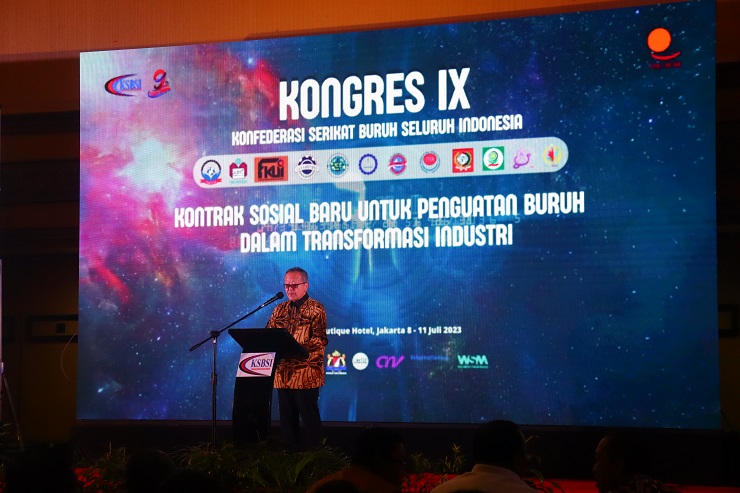ACV-CSCIASIA.ORG, JAKARTA – Shoya Yoshida, Secretary General of the International Trade Union Confederation (ITUC) congratulated KSBSI at the IX Congress on behalf of 60 million women and men workers in Asia and the Pacific. He must start with a message of peace. Russia’s invasion of Ukraine continues.
“Our sincere condolences to the victims of the war and their families. We pray that after this difficult situation, their lives and those of their loved ones will return to normal soon.” said Mr Shoya in his speech at opening the IX KSBSI Congress, Saturday (08/07/2023).
Shoya stressed, Not only in Ukraine, when looking at the area in Myanmar, freedom and democracy have been deprived for the past two and a half years. Workers and trade union leaders are suffering under the oppression of authoritarian leaders in Afghanistan, Hong Kong and many other places.
Everyone dreams of decent work, quality social services and universal social protection. Imagine if only a small part of the budget devoted to military spending was used to introduce and implement social reforms. Many people will have a more prosperous life and a more just society so as to create a society that is free from intimidation and violence, upholds peace and people-centered development.
Why do leaders fail to promote people-centred policies?
Over the years, political power has been concentrated in elites who are heavily influenced by corporations and the wealthy or part of the economic and financial sector itself. As a result, the political and economic system is designed to support the rich and large corporations. Globalization has not only failed to strengthen workers’ competitiveness, but has also weakened their influence in national and global decision-making.
Most leaders prefer to surround themselves with opinions that validate their beliefs and ignore voices that oppose them. For them, democracy which functions to unify the voices of the people is a threat to their firm grip on political power. In doing so, leaders and their governments continue to silence the voice of trade unions, which are important mouthpieces of democracy.
Yet, despite the crackdown and democratic backsliding, the workers did not give up. Trade unions, throughout their history, have constantly championed worker dignity in the workplace and social justice for all. They have defended workers’ rights, jointly demanding minimum wages, maximum hours worked, health and safety, freedom of association, and the right to bargain collectively.
Now is the time to negotiate a new social contract by placing the people and the work they do at the center of development. All stakeholders must take responsibility for building a fair and equitable future of work and ensuring greater investment in community capacity building and decent job creation.
In order to realize the new social contract, the great majority of the people must regain influence to be able to rewrite the rules of capitalism and the rules of politics. Realizing a new social contract requires building and consolidating the power of workers to collectively advance their demands and challenge the current neoliberal and undemocratic economic and political order.
“We must rebuild the balancing forces to gain stronger bargaining power in negotiating a new social contract, to change the current system in favor of the greatest number of people. To this end, unions must continue their traditional efforts to organize more workers. At the time At the same time, trade unions must go beyond traditional trade unions and must have the potential to work with a wide range of stakeholders in society, placing the greatest emphasis on decent work.” he explained.
When regressive laws affecting workers equally, and other sectors are introduced, trade unions have to mobilize not only a strong constituency among workers, but also strong support from other sectors of society.
In Indonesia, you already have a successful example. Due to the far-reaching impact of laws undermining rights and protecting the environment in favor of prioritizing interests to attract foreign direct investment, trade union-led protests were widespread throughout the country, and widely supported by farmers, academics, students, and individuals and groups. other organizations with the same thought. Due to persistent public pressure and lobbying, the court ordered the government in November 2021 to change the unconstitutional provisions of the law within two years.
“You have tried enough, but there is still much to be done so that this Omnibus law is truly beneficial to society. The solidarity of 60 million organized workers and many other workers will help you make it happen. Once again we must be sure that each of us, united, have the power to make waves in society, and change the course of the existing order.” he said.
This congress gives us the opportunity to build an inclusive movement to reinforce our call for a new social contract. Solidarity is the way forward. Let us march forward in solidarity that ushers in the future of work we desire.
Present invited international guests at the IX KSBSI Congress including, Stijn Sintubin-ACV/CSC-Belgium, Laura Eliaerts-ACV/CSC-Belgium, Paapa Danguah-ITUC-Belgium, Jeroen Roskams-WSM-Belgium, Sara Caustermains-WSM-Belgium, Bruno Deceukelier-WSM-Nepal, Patuan Samosir-ITUC AP-Singapore, Anna Tuvera-ITUC AP-Singapore, Akiko Gono-RENGO/ITUC-Japan, Ronaldo Mangampo Adonis-KMU-Phillippine, Mary Ann Castillo-KMU-Phillippine, Julius Cainglet-FFW-Phillippine, Heng Chenda-CLC-Cambodia, Khong Athit-CCAWDU-Cambodia, Chhorn Sokkhoneu’s-CCAWDU-Cambodia, Sok Kin-BWTUC-Cambodia, Sohrab Ali-GBGWF-Bangladesh, Sultana Begum-GBGWF-Bangladesh, Md. Elias-GBGWF-Bangladesh, Hang Thung Hoang-VGCL-Vietnam, Sylvain Goldstein-CGT-France, Elly Rosita Silaban President of KSBSI.


